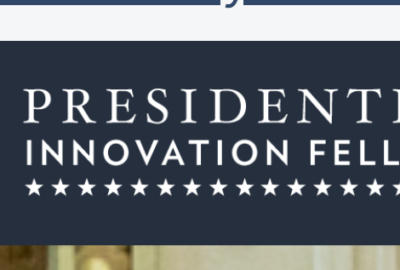
The latest batch of Presidential Innovation Fellows are here. Hear about some of their stories and how you could be the next one
The General Services Administration (GSA) recently announced the Presidential Innovation Fellows (PIF) cohort for 2023. That means 20 private-sector technology ...
The General Services Administration (GSA) recently announced the Presidential Innovation Fellows (PIF) cohort for 2023. That means 20 private-sector technology and innovation leaders will start pitching-in at 13 federal agencies. To learn more about this year’s fellows, as well as some of the unique aspects of the program itself, Federal Drive with Tom Temin spoke with Ann Lewis, director of Technology Transformation Services at GSA.
Interview Transcript:
Ann Lewis The Presidential Innovation Fellows Program started in 2012 under the Office of Science, Technology and Innovation at the White House. And it found its home in GSA in 2013 under Technology Transformation Services, the organization I now run. Over the last ten years, the Presidential Innovation Fellows program has connected experienced technology and innovation leaders to government agencies to help these agencies deliver better government services and better government experiences to the public. The fellows come from a variety of backgrounds industry, nonprofits, academia. They are technology leaders, entrepreneurs, innovators who bring a wealth of experience in fields like product management, design, strategy, artificial intelligence, data science and cloud infrastructure. They use their expertise and fresh perspective to work with agency teams and leaders on a variety of projects, from strategy to capacity building to modernization work. All of us work centered around improving the way the government builds designs and delivers its services for the public. There’s so much that we’re excited about this year, and I’d love to share some stories about the projects and programs that fellows have been placed in.
Eric White Absolutely. Please do.
Ann Lewis For this 2023 cohort, there are 20 fellows that onboarded last month, and they’re embedded in agencies across the federal government, including the Department of Defense, the [Veterans Affairs (VA)], NASA, the CDC, [Advanced Research Projects Agency for Health (ARPA-H)] and others. And I’d love to share a couple of stories about interesting work our fellows are doing this year. We have Antoinette Coleman at USDA who advises the Special Supplemental Nutrition Program for Women, Infants and Children, otherwise known as WIC, which feeds 6.2 million participants a month. This fellow is leading a team to make WIC’s platform more accessible to the public. We also have two fellows at ARPA-H, the new Advanced Research Projects Agency for Health, who are providing invaluable cross-agency perspectives and expertise on the role of data in health care and digital strategy. And we also have all ends open at the Small Business Administration, where I used to work as a senior advisor for technology and was previously a PIF sponsor before taking my current role as director of Technology Transformation Services.
Ann Lewis Avalon is a data scientist and technology leader whose project is supported with American Rescue Plan funds. And the story behind this project, is last year, the Small Business Administration ran an American Rescue Plan program called the Community Navigator Program that had the goal of helping business owners keep their businesses going during the pandemic by identifying and connecting entrepreneurs with grants and community support, and distributing resources by tapping into their community networks. But to do this most effectively, they needed to be able to make sense of many disparate business demographic data sets. And as we all know, data is messy. Avalon jumped right in, and I remember her drive to just figure it out. She developed a framework to analyze geographic and demographic data, at a more granular level, by incorporating additional datasets from other [Small Business Administration (SBA)] programs and agency sources. And thanks to her work, the SBA was able to make the Community Navigator program more effective by using data mining and visual analytics techniques to identify underserved entrepreneurs participating in the program. And this allowed the SBA to set goals around equity and strategically partner with local organizations to conduct outreach in underserved communities, which ultimately improved access to the community Navigator program. Avalon was very pragmatic in the way that she applied her expertise to the opportunity and worked hand in hand with the community Navigator team. This is what we want to see with our Presidential Innovation Fellows. Dive right in, figure it out, lead collaboratively and pragmatically. Use your skills to meet the agency where it is and create impact.
Eric White Cool stuff. So as a former PIF sponsor yourself and in talking with the fellows this year, what drives them to want to be a part of this program? And you mentioned the pandemic, I’m wondering if that had any effect on, I felt it as well. I’m sure you and many of us felt it while we were sitting at home. We all sort of try to come together when the country needs us. And was there a desire to serve, coming out of that historical event?
Ann Lewis There’s been an overwhelming desire to serve that we’ve seen from technologists at all levels, but especially at the senior level. It’s a great time to work in government if you’re a technology leader. Based on my experience in the private sector, it’s possible to have impact if you work really hard and work your way up to the corporate ladder of a big company, maybe you will be in charge of millions of dollars or impact millions of users. But by default, every single government program that you could work on as a technology leader will have millions or billions of dollars of impact, will impact hundreds of millions of people who need access to the basic services that government provides to help them through different kinds of life experiences, through crises like the pandemic. It’s impossible not to have a huge impact as a senior technology leader in government. And I think a lot of other people felt that way and felt the call to serve. This year, we received close to a thousand applicants to the Presidential Innovation Fellows program, and that’s no surprise given an overall desire to serve, and also the Presidential Innovation Fellows legacy as an impact driven program that plays an active role in key administration goals and priorities. And we try to bring in more senior folks into this program and assess both their technology and leadership skills.
Eric White Yeah, and it seems like a good way for a senior technologist to get their feet wet if they don’t have much government experience. What can you tell me about that? And how it sort of may help a person transition from the private sector to government such as yourself did?
Ann Lewis I think the important thing to remember when coming into government for the first time is to spend a lot of time talking to people and listening and really understanding the structure of the programs that you’re involved in and working with. Everything is the way it is for good reasons. And so I think a place where new technology leaders to government can succeed is to be low ego, to be aware of your expertise and experience, but also aware that everyone you’re working with as a wealth of knowledge and understanding about why programs are the way they are, and to be extremely pragmatic about understanding which problems exist and why? What problems can be solved in which ways? And to build coalitions and work together with a broader community of leaders and individual contributors. A government program or project is not a success unless it’s success for everyone, because you need everyone at the table to be able to make that long term impact and to be able to deliver better government experiences to the public.
Eric White Yeah, and going the other way, I’m thinking of the Defense Department. There are more partnerships with private sector entities than ever. How does this help leverage ideas from the technology sector that may have not made its way into the federal agencies yet?
Ann Lewis Well, it’s a very direct way to bring in tech industry best practices into government, and also ideas from nonprofits and academia. The Presidential Innovation Fellows program brings in people with expertise in a wide variety of fields who bring in not just ideas, but also fresh perspectives that they bring to their work with agency teams and leaders. So I think that it’s a great bridge between public and private, and it helps us to build shared language.
Eric White Yeah, and that’s a great segue to my last question, which is, clearly DEI, diversity, equity and inclusion is a big factor in a lot of government initiatives, especially on the hiring front. So I imagine that this helps kind of grab people from different backgrounds that may or may not have a chance to get a foot in the door, so to speak. What can you tell me about that?
Ann Lewis Well, this particular program recruits, is extremely competitive in recruit senior level folks who’ve spent decades building experience in the private sector. So all of the applicants to the program really earned their stripes and they bring in a diversity of skills, experiences and perspectives that are best in class in their areas of expertise. So we focus primarily on figuring out how to identify 20 people out of those 1,000. It’s an incredibly competitive hiring process and then working with agencies to match applicants to agency programs and agency program needs. And so if I may, I’d love to just plug the program for agency partners. We’re looking for projects right now in agency partners. And the sooner we find out more about what agencies are looking for, the more we can filter that 1,000 or more candidates. There could be more than a thousand this year. All of our hring processes right now are extremely competitive. We can best match the people at the top of their field to what agencies are looking for, in terms of senior and executive skills. I’d love to just say that if anyone is currently listening to this who’s at a federal agency right now, if you’d like to submit a program to the Presidential Innovation Fellows program for a 24, the time is now. And if you’re a senior technology leader and you’re interested in this program, I just wanted to say like, please do consider government service. The amount of impact that you can have is is truly incredible. And being able to serve your country at such a critical time really is an honor.
Eric White All right. And where’s the best place for them to find more information if they’re looking for it?
Ann Lewis If you’re interested in learning more about the Presidential Innovation Fellows program or how to submit an application to become a fellow or how to submit an agency project proposal, you can go to PIF.gov. Applications for the 2024 Presidential Innovation Fellows cohort open May 15.
Copyright © 2024 Federal News Network. All rights reserved. This website is not intended for users located within the European Economic Area.
Tom Temin is host of the Federal Drive and has been providing insight on federal technology and management issues for more than 30 years.
Follow @tteminWFED





